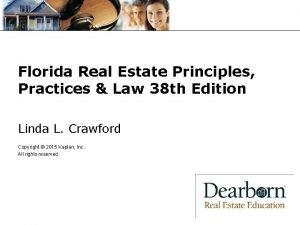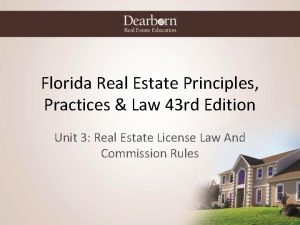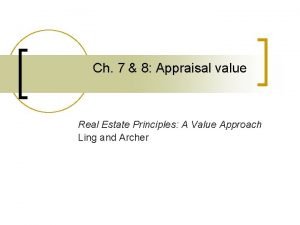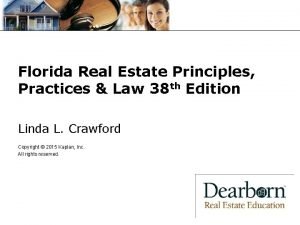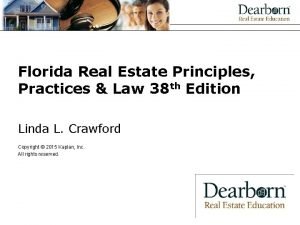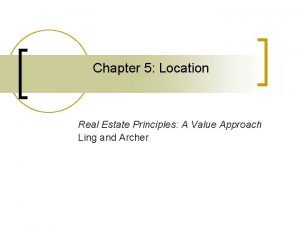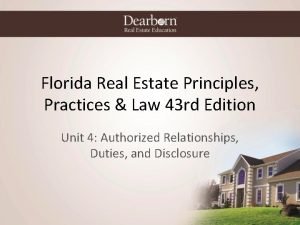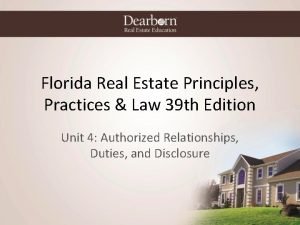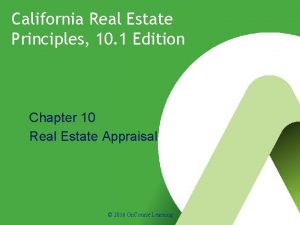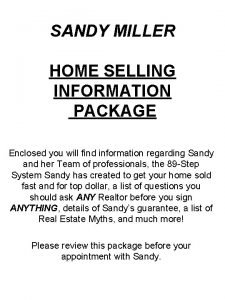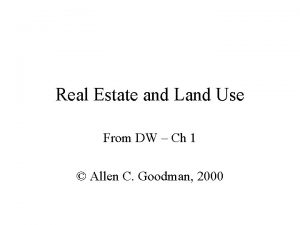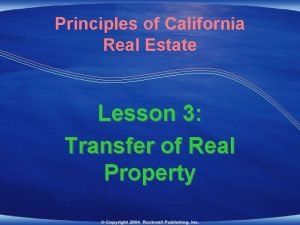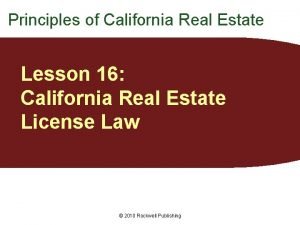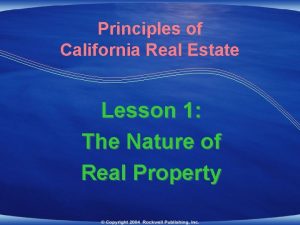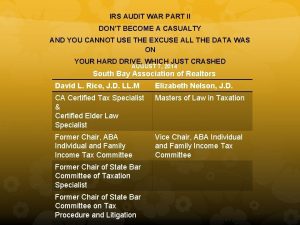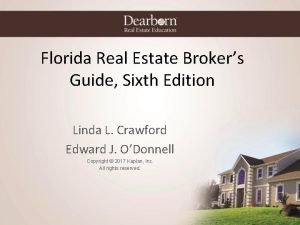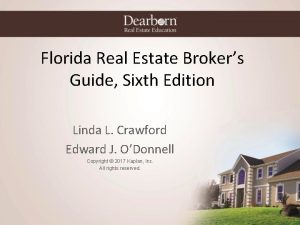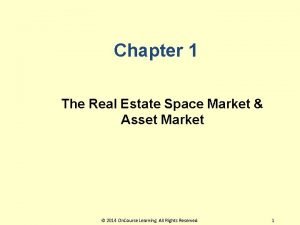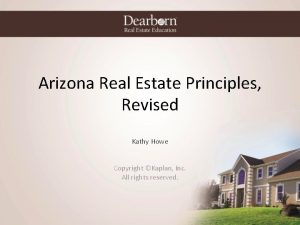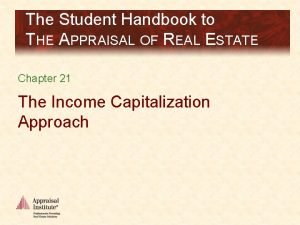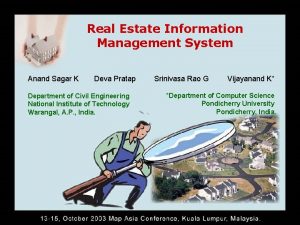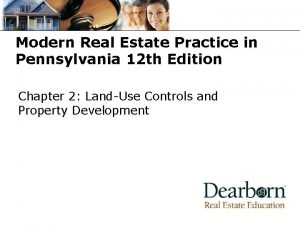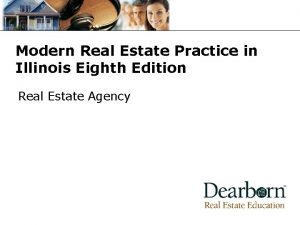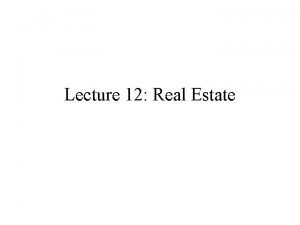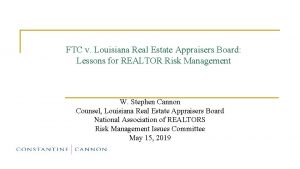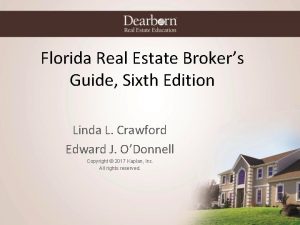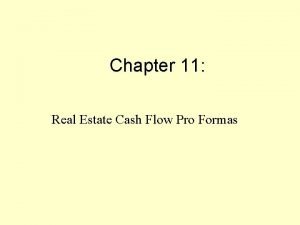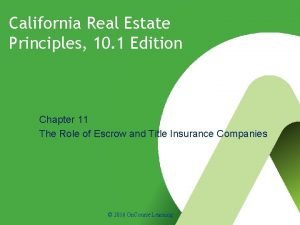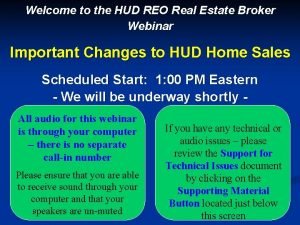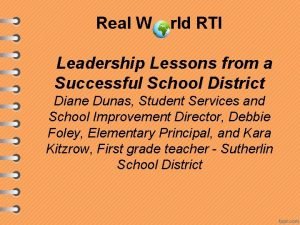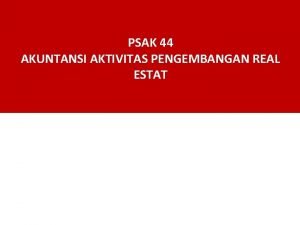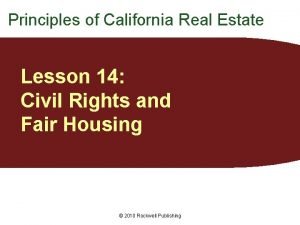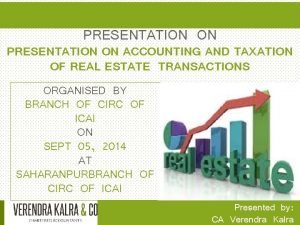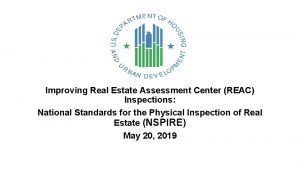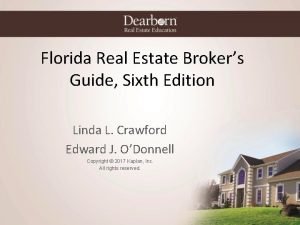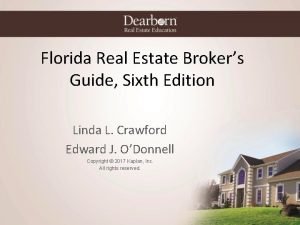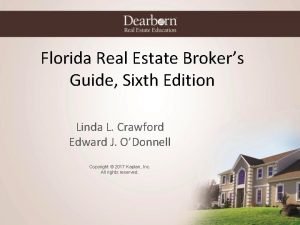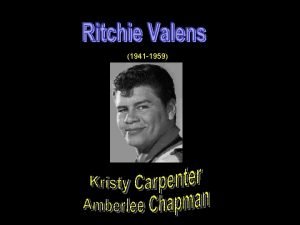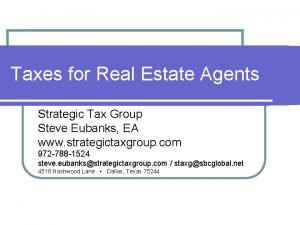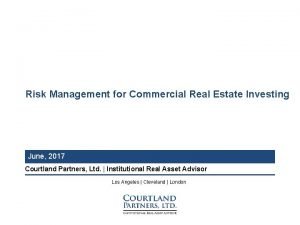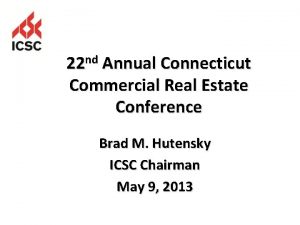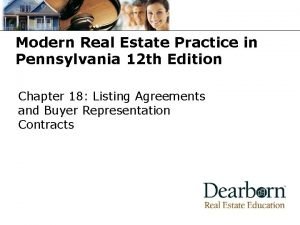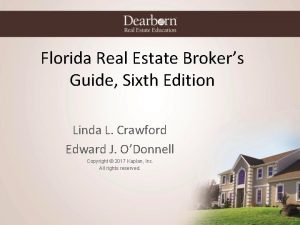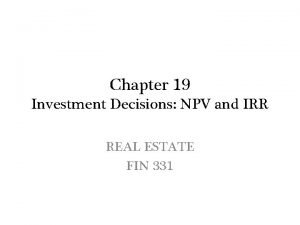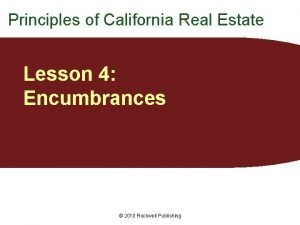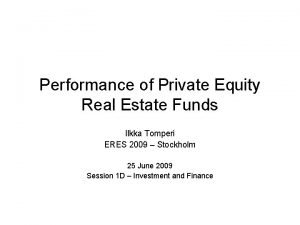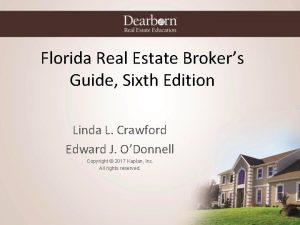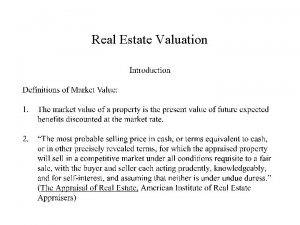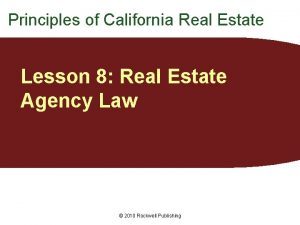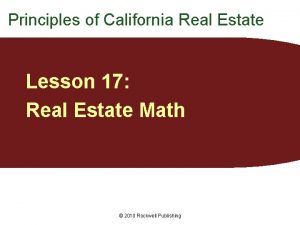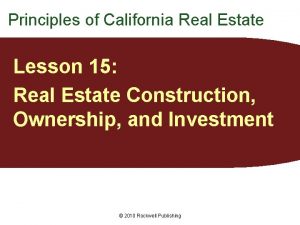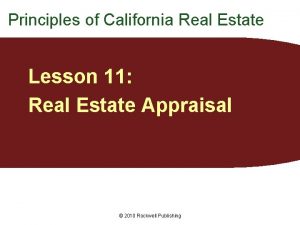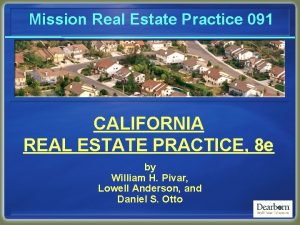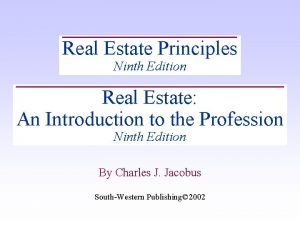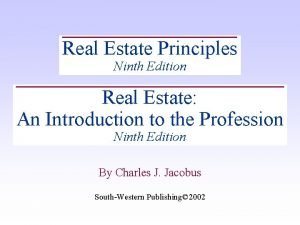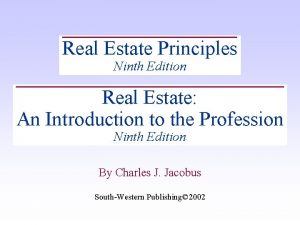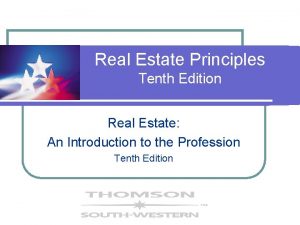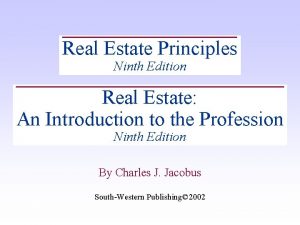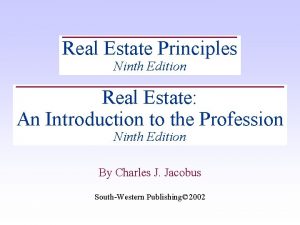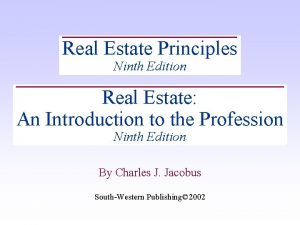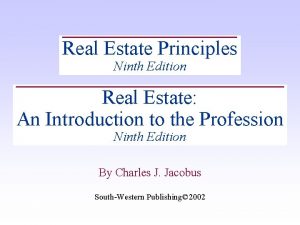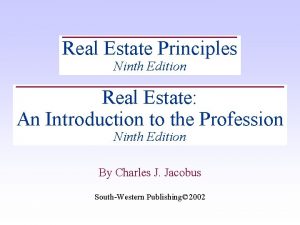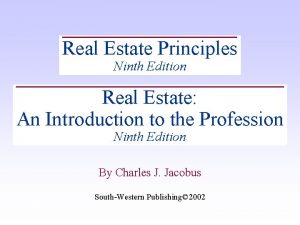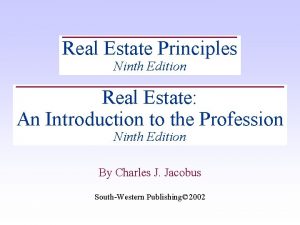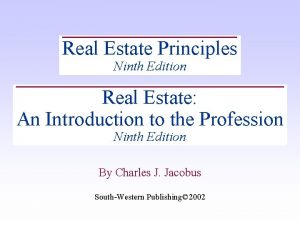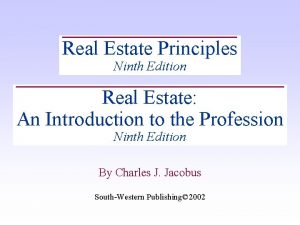Principles of California Real Estate Lesson 16 California










































































































- Slides: 106

Principles of California Real Estate Lesson 16: California Real Estate License Law © 2010 Rockwell Publishing

Administration of Real Estate Law California’s Real Estate Law is administered by Department of Real Estate (DRE). l Chief officer of DRE is Real Estate Commissioner. © 2010 Rockwell Publishing

Administration of Real Estate Law Real Estate Commissioner: l appointed by Governor l may not engage in real estate activities or have interest in real estate firm l must have been real estate broker actively engaged in business in California for 5 years (or related experience) © 2010 Rockwell Publishing

Administration of Real Estate Law Commissioner’s powers and duties: l grants and denies licenses l enforces Real Estate Law l issues rules and regulations to implement law l regulates sale of subdivisions and business opportunities l investigates non-licensees performing real estate activities l holds disciplinary hearings on license violations © 2010 Rockwell Publishing

Administration of Real Estate Law California Attorney General provides legal advice to Commissioner regarding Real Estate Law. l Violations of Real Estate Law are prosecuted by district attorney of county in which they occur, not by state Attorney General. © 2010 Rockwell Publishing

When License is Required Anyone who is acting, advertising, or appearing to act as real estate broker or salesperson must have real estate license. © 2010 Rockwell Publishing

When License is Required Definition of a broker Real estate broker: Person who does, or negotiates to do, certain acts on behalf of another person, for compensation or promise of compensation. l Real Estate Law describes broad range of activities brokers may perform. © 2010 Rockwell Publishing

When License is Required Broker activities Selling, buying, or exchanging real property or business opportunity. Leasing or collecting rents from real property or business opportunity; or buying, selling, or exchanging leases on real property or business opportunity. © 2010 Rockwell Publishing

When License is Required Broker activities Soliciting prospective sellers, buyers, or tenants, or listing real property or business opportunity for sale or lease. Locating or filing application for the purchase or lease of state or federal lands. © 2010 Rockwell Publishing

When License is Required Broker activities Collecting advance fee to promote the sale or lease of real property or business opportunity by advertising or listing it, by obtaining financing, or in some other way. © 2010 Rockwell Publishing

When License is Required Broker activities Soliciting borrowers or lenders or negotiating loans secured by liens on real property or business opportunities, or collecting payments or performing other services in connection with such loans. l Brokers must obtain separate mortgage loan originator (MLO) endorsement before engaging in these activities in connection with residential mortgage loans. © 2010 Rockwell Publishing

When License is Required Broker activities • An MLO endorsement is obtained through the Nationwide Mortgage Licensing System and Registry, and requires its own prelicense and continuing education. • An MLO endorsement is also required for a real estate license to receive compensation from a lender or mortgage originator, even when only performing real estate brokerage activities. © 2010 Rockwell Publishing

When License is Required Broker activities Selling, buying, or exchanging real property securities, land contracts, or promissory notes secured by liens on real property or business opportunities, and performing services for holders of contracts or notes. © 2010 Rockwell Publishing

When License is Required Broker activities Engaging as principal in business of buying, selling, or exchanging 8 or more real property securities (sales contracts, promissory notes, etc. ) within one year. l Note that this activity refers to broker who is acting on her own behalf. © 2010 Rockwell Publishing

Types of Licenses Salesperson’s license Salesperson: Someone who’s hired by broker to do one or more real estate activities allowed under law. l Can engage in real estate activities only as broker’s representative. l Cannot represent members of the public directly. © 2010 Rockwell Publishing

Types of Licenses Associate broker Licensed broker who works for another broker rather than starting her own brokerage is sometimes called associate broker. l There is no special “associate broker’s license. ” l While working as associate broker, broker has essentially same status as salesperson or “affiliated licensee. ” © 2010 Rockwell Publishing

Types of Licenses Business entities A real estate license can be issued to a corporation: l if at least one corporate officer is designated to act as broker for corporation, and l that person is licensed as a broker. © 2010 Rockwell Publishing

Types of Licenses Penalties for unlicensed activities Penalty for acting without license includes: l fine of up to $20, 000 and/or 6 months prison for individuals l fine of up to $60, 000 for corporation © 2010 Rockwell Publishing

When License Not Required Law provides exceptions to licensing requirement for certain persons who are: l acting on their own behalf l regulated by another agency l performing functions that don’t require expertise © 2010 Rockwell Publishing

When License Not Required Person buying or leasing property: l for himself, or l on behalf of group to which he belongs (such as partnership or corporation). © 2010 Rockwell Publishing

When License Not Required Attorney in fact authorized by recorded power of attorney. Attorney at law, in performance of her duties as a lawyer. © 2010 Rockwell Publishing

When License Not Required Person acting under court order, such as: l executor or administrator of estate l receiver in bankruptcy Trustee under a deed of trust. © 2010 Rockwell Publishing

When License Not Required With respect to mortgage loan activities, representatives or employees of: l financial institutions, insurance companies, pension funds, or credit unions l federally approved housing counseling service l cemetery authority l licensed finance lender or residential mortgage lender or servicer © 2010 Rockwell Publishing

When License Not Required With respect to business opportunity transactions, licensed securities broker or dealer. © 2010 Rockwell Publishing

When License Not Required Persons performing purely clerical duties and not discussing price, terms, or condition of property. The manager of hotel, motel, or trailer park, or employee of the manager. © 2010 Rockwell Publishing

When License Not Required Resident apartment manager or employee of the manager. Employee of property management company, supervised by licensee working for the company. © 2010 Rockwell Publishing

Summary Administration of Real Estate Law • • • Department of Real Estate Commissioner Broker Salesperson Associate broker When license not required © 2010 Rockwell Publishing

License Qualifications Salesperson To obtain salesperson’s license applicant must: l be at least 18 years old l be honest and truthful l pass state exam and pay license fee l be fingerprinted, provide social security number, and proof of legal presence in U. S. l complete 3 courses (9 semester units) © 2010 Rockwell Publishing

License Qualifications Broker For broker’s license, applicant must: l be at least 18 years old l be honest and truthful l pass state exam and pay license fee l be fingerprinted, show social security number, and proof of legal presence l have at least 2 years of experience as salesperson in last 5 years, or equivalent l complete 8 courses (24 semester units) © 2010 Rockwell Publishing

License Application and Term Applying for a license Applicant must apply for license within one year after date of passing exam (not the date notice was received). © 2010 Rockwell Publishing

License Application and Term Renewing a license License valid for 4 years. Licensee renews by: l completing continuing education requirements l submitting application l paying renewal fee No need to take state exam again. © 2010 Rockwell Publishing

License Application and Term Late renewal License expires if licensee misses 4 -year renewal deadline. l Grace period: License can be renewed within 2 years after expiration, at Commissioner’s discretion, if late penalty is paid. © 2010 Rockwell Publishing

License Application and Term Late renewal After 2 -year grace period ends: l all license rights are lost l former licensee would have to take state exam again and apply for new license © 2010 Rockwell Publishing

License Application and Term Renewals Real estate license can’t be renewed unless licensee has fulfilled continuing education requirements. l Forms documenting attendance at courses must accompany renewal application. l Salespersons and brokers must complete at least 45 hours of continuing education (over 4 years), with certain courses specified depending on whether it is first renewal or subsequent renewal. © 2010 Rockwell Publishing

Summary License Qualifications/Application/Term • • • Salesperson’s license Broker’s license License application and term Expiration and renewal Continuing education © 2010 Rockwell Publishing

Other License Provisions Fictitious names Broker may conduct business under fictitious name if broker: l files fictitious name statement with county clerk l publishes notice in newspaper at least once a week for four weeks l submits affidavit proving publication l Affidavit: Written statement sworn before a notary public. © 2010 Rockwell Publishing

Special Activities Real property securities dealer is person engaged in business of selling or reinvesting funds in real property securities. l Person engaged in these activities in California is required to have real estate broker’s license, unless licensed as securities broker-dealer. © 2010 Rockwell Publishing

Business Opportunities Business opportunity: Sale or lease of a business, typically including inventory, fixtures, lease assignments, and goodwill. l Listing a business opportunity, or representing buyer, requires real estate license, even if no real property involved. l If shares of stock involved, agent may also need securities license. © 2010 Rockwell Publishing

Business Opportunities Franchise agreement: Purchaser (franchisee) buys right to sell goods under franchisor’s brand name and marketing system, in exchange for franchise fee. l Franchise may be sold by real estate licensee, securities licensee, or any person registered with Commissioner of Corporations. © 2010 Rockwell Publishing

Business Opportunities In sale of business opportunity, bill of sale is typically used. l If sale involves real property and personal property, two sales agreements may be used. Escrow is typically used in sale of business opportunity. l Two separate escrows may be used if both personal and real property sold. © 2010 Rockwell Publishing

Business Opportunities Sales tax Sales of business opportunities are subject to state sales tax, because they involve transfer of personal property. A buyer of wholesale or retail business should obtain Certificate of Clearance from state Board of Equalization, certifying that seller’s sales taxes have been paid. l Otherwise buyer may have successor’s liability for unpaid sales taxes. © 2010 Rockwell Publishing

Business Opportunities Bulk sale: Sale, not in the ordinary course of business, of more than half of seller’s inventory. l Uniform Commercial Code imposes certain requirements on bulk sales. © 2010 Rockwell Publishing

Business Opportunities Bulk sales Before bulk sale occurs, buyer must: l notify seller’s creditors of plans by recording notice of intent to buy with county recorder l send notice to county tax collector l publish notice in newspaper If notice requirements aren’t met, buyer may become liable to seller’s creditors. © 2010 Rockwell Publishing

Business Opportunities Liquor licenses Sale of business opportunity may involve a liquor license. l On-sale liquor license is one that may, subject to approval, be transferred from person to person, or to different premises. l During first 5 years after issuance of liquor license, on-sale license may not be resold for more than cost of initial application. © 2010 Rockwell Publishing

Summary Special Activities/Business Opportunities • • • Real property securities dealer Business opportunity Franchise agreement Sales tax Bulk sale Liquor licenses © 2010 Rockwell Publishing

Disciplinary Action Commissioner may take disciplinary action against licensee who violates Real Estate Law. Procedures involved include: l commissioner’s investigation l written accusation l administrative hearing © 2010 Rockwell Publishing

Disciplinary Procedures Commissioner’s investigation Commissioner must investigate all verified written complaints against licensees, and may also initiate investigation on her own (without formal complaint). © 2010 Rockwell Publishing

Disciplinary Procedures Accusation If investigation warrants formal action, Commissioner: l files accusation l schedules administrative hearing Accusation: Written statement of charges. l Must be filed within 3 years of alleged violation (more time if charge involves fraud, misrepresentation, or false promise). © 2010 Rockwell Publishing

Disciplinary Procedures Administrative hearing Hearing conducted by administrative law judge. l Judge makes proposed decision after hearing testimony. l Commissioner accepts or rejects proposed decision when making his final decision. © 2010 Rockwell Publishing

Disciplinary Action Sanctions If accusation proved, Commissioner may: l suspend or revoke license, or l impose fine of up to $250 for each day license would have been suspended. l Maximum fine: $10, 000 © 2010 Rockwell Publishing

Disciplinary Action Appeal Disciplined licensee may: l petition for reconsideration from Commissioner, and/or l appeal Commissioner’s decision to superior court © 2010 Rockwell Publishing

Disciplinary Action Prosecution and civil liability Licensee disciplined by Commissioner may also face: l criminal prosecution by county prosecutor l civil suit by an injured party © 2010 Rockwell Publishing

Grounds for Disciplinary Action Grounds for disciplinary action include—but are not limited to—any of following violations. © 2010 Rockwell Publishing

Grounds for Disciplinary Action Misrepresentation: Deliberately or negligently making false statements or failing to disclose material facts to principal. False promise: Making false promise that is likely to persuade someone to do or refrain from doing something. © 2010 Rockwell Publishing

Grounds for Disciplinary Action False advertising or running blind ads. l Blind ad: Advertisement placed by real estate licensee that does not include licensee designation and broker’s name. © 2010 Rockwell Publishing

Grounds for Disciplinary Action Acting as dual agent without consent of both parties. Commingling general funds with trust funds. Failing to put definite termination date in exclusive listing agreement. Failing to disclose a profit in option to purchase (secret profit). Fraud or dishonest dealing. Failing to use real property transfer disclosure statement. © 2010 Rockwell Publishing

Grounds for Disciplinary Action Being convicted of felony or misdemeanor involving moral turpitude. Willfully using any trade name of real estate organization that you are not member of. Performing licensee activities negligently or incompetently. As broker, failing to exercise reasonable supervision over salespersons. Failing to disclose personal interest in property to buyer. © 2010 Rockwell Publishing

Grounds for Disciplinary Action As broker, failing to notify Commissioner of discharge of any salesperson based on violation of license law. Mobile home irregularities, including fraud in application for registration of a mobile home. As broker, failing to notify parties of selling price. Illegal compensation for referring customer to escrow, pest control, home warranty, or title insurance companies. © 2010 Rockwell Publishing

Real Estate Fund All license fees go to state treasury, and are then credited to Real Estate Fund. Portions of Real Estate Fund are earmarked for: l the Education and Research Account l the Recovery Account © 2010 Rockwell Publishing

Real Estate Fund Recovery account The Recovery Account is used to reimburse parties injured by real estate agent’s: l fraud l misrepresentation l deceit l conversion of trust funds © 2010 Rockwell Publishing

Recovery Account Requirements Injured party must: l obtain civil judgment (or arbitration award) against agent, and l show that agent has insufficient funds or assets that can be seized to pay judgment or award. © 2010 Rockwell Publishing

Recovery Account Limitations Recovery Account will pay: l up to $50, 000 for any one transaction l up to $250, 000 for any one licensee Agent’s license suspended until amount paid out is repaid to Recovery Account, with interest. © 2010 Rockwell Publishing

Summary Disciplinary Action • Disciplinary procedures • Grounds for disciplinary action • Sanctions • Real Estate Fund • Recovery Account © 2010 Rockwell Publishing

Trust Funds Trust funds: Money or other valuables received by broker on behalf of someone else, which are held while performing any acts requiring real estate license. l May be cash, check, promissory note, or any other item of personal property. © 2010 Rockwell Publishing

Trust Funds that real estate brokers hold in trust for clients: l good faith deposits l tenant security deposits l collected rents l advance fees Advance fees: Fees seller pays in advance for expenses associated with a listing. © 2010 Rockwell Publishing

Trust Accounts Separate from general account Broker must maintain one or more trust accounts to keep trust funds separate from broker’s own money. Trust accounts should be: l opened in broker’s name as licensed l specially designated as trust accounts © 2010 Rockwell Publishing

Handling Trust Funds should be deposited in trust account no later than third business day after they’re received. Broker may pass check directly from principal to escrow or another principal without putting it in trust account first. l Check should still be recorded in broker’s trust fund records. © 2010 Rockwell Publishing

Handling Trust Funds If principal gives check directly to third party, such as title company, without it ever passing through broker’s hands, broker does not need to enter it into trust fund records. © 2010 Rockwell Publishing

Handling Trust Funds Receipt by salesperson When trust funds are given to salesperson, salesperson should immediately: l deliver funds to her broker, or l as directed by broker, deliver funds to broker’s trust account, neutral escrow account, or to principal. © 2010 Rockwell Publishing

Handling Trust Funds Good faith deposits Exception to rule: Good faith deposit check can be held uncashed until buyer’s offer is accepted, so long as: l check is not negotiable by licensee or buyer has given written instructions not to deposit or cash check until acceptance, and l seller is informed that check is being held. © 2010 Rockwell Publishing

Handling Trust Funds Good faith deposits Before seller accepts offer: l good faith deposit belongs to buyer l must be returned to buyer if he demands it © 2010 Rockwell Publishing

Handling Trust Funds Good faith deposits After offer accepted: l broker may hold check only with seller’s written authorization l no part of deposit can be refunded without seller’s written permission © 2010 Rockwell Publishing

Handling Trust Funds Good faith deposits If transaction fails to close, and parties dispute who is entitled to deposit: l Broker (or escrow agent) files interpleader action and turns funds over to court. l Court decides which party gets deposit. © 2010 Rockwell Publishing

Handling Trust Funds Commingling: Illegally mixing trust funds with personal funds. l Broker must never put trust funds into her general account, or her funds into trust account, even if careful records kept. Conversion: Appropriating client funds for broker’s own purposes. l Conversion is basis for theft charges. © 2010 Rockwell Publishing

Handling Trust Funds Commingling Funds in trust account should always equal broker’s trust fund liability. l Shortage or overage are both violation of Real Estate Law. Exception: Broker may keep up to $200 of her own funds in trust account to pay bank’s service charges. © 2010 Rockwell Publishing

Trust Accounts Commingling If broker is owed commission from trust funds, she may withdraw it directly from trust account. l Broker cannot make any other withdrawals from trust account for either personal or business reasons. © 2010 Rockwell Publishing

Trust Accounts Commingling Rule against commingling makes it difficult for broker to dip into trust funds for her own benefit. It also protects trust funds from any legal action that may be taken against broker. l If trust funds were in broker’s general account, creditor with judgment against broker might seize the trust funds. © 2010 Rockwell Publishing

Trust Accounts Reconciliation: process of comparing trust fund balance to sum of individual transactions. l When reconciled, trust account balance must equal total of balances due to individual beneficiaries (clients and customers). © 2010 Rockwell Publishing

Trust Accounts Withdrawals Broker may not deduct her commission from trust fund until after transaction closes. Once earned commission is transferred to broker’s general account, money may be used to pay obligations, such as salesperson’s commission. © 2010 Rockwell Publishing

Trust Fund Records Broker’s records must include: l all trust fund receipts and disbursements l balance of each trust account l all receipts and disbursements affecting each client or customer’s account l balance owed to each client or customer Receipts and disbursements must be in chronological order. © 2010 Rockwell Publishing

Trust Fund Records Trust fund records must be kept for at least 3 years after date of closing (or listing date, if transaction didn’t close). Records are subject to inspection by Commissioner. © 2010 Rockwell Publishing

Trust Fund Records Advance fees must be handled in compliance with trust fund rules. l Can’t be commingled with broker’s funds. l Must be deposited into broker’s trust account within three days after receipt. l Salesperson/broker must obtain prior approval from DRE for: l advertising, and l advance fee agreement. © 2010 Rockwell Publishing

Documentation Requirements Broker must also keep real estate transaction documents for at least 3 years after closing date (or listing date, if sale doesn’t close), and have them available for inspection by Commissioner. © 2010 Rockwell Publishing

Documentation Requirements Three-year requirement applies to: l listing and buyer representation agreements l deposit receipts l rent collection receipts l bank deposit slips l canceled checks and supporting papers l agency disclosure statements l transfer disclosure statements l property management agreements © 2010 Rockwell Publishing

Documentation Requirements Records that must be kept for 4 years: l disclosure statements given to noninstitutional lenders or trust deed purchasers l real property security statements © 2010 Rockwell Publishing

Documentation Requirements Broker-salesperson agreement must be: l in writing l kept on file at broker’s office l retained for at least three years after relationship is terminated © 2010 Rockwell Publishing

Advertising Regulations False advertising and other violations of advertising laws are: l grounds for disciplinary action under Real Estate Law l misdemeanors (under California law) © 2010 Rockwell Publishing

Advertising Regulations Licensee designation An advertisement published by real estate agent must include licensee designation: l some indication in ad that advertiser is licensee Ads without this designation are illegal, unless licensee is advertising his own property. © 2010 Rockwell Publishing

Advertising Regulations First contact solicitation materials Licensee must include license ID number in any solicitation materials intended to be first point of contact with consumers (potential clients or customers). Includes: l business cards and stationery l advertising fliers © 2010 Rockwell Publishing

Advertising Regulations Online advertising Broker who advertises on the Internet must establish procedures to make sure that a real estate licensee responds to all inquiries from prospective clients resulting from ad. © 2010 Rockwell Publishing

Advertising Regulations Loans and notes Ads for loan products must be approved by DRE before publication. © 2010 Rockwell Publishing

Advertising Regulations Loans and notes Ads for loan may not: l use phrase like “guaranteed” without describing how loan is secured l use misleading terms l imply that the loan: l can be approved over the telephone l is endorsed by a government agency l has better terms than are actually available © 2010 Rockwell Publishing

Advertising Regulations Loans and notes Ads for promissory note: l can’t promise yield or return different from rate specified on note, unless it also reveals note rate and discount at which note is being sold. l Discount: Difference between outstanding note balance and sales price of note. © 2010 Rockwell Publishing

Advertising Regulations Inducements If attendance at sales presentation or compliance with other conditions is required in order to receive gift or prize, those terms must be disclosed. If inducement is given to one party in a transaction, this must be disclosed to all parties. l Note: Inducements are always forbidden as part of loan transactions. © 2010 Rockwell Publishing

Other Brokerage Topics Desk cost is brokerage’s operating cost per salesperson. l It is calculated by dividing firm’s operating expenses by the number of salespersons. In 100% brokerage, salesperson keeps all of his commissions but must pay desk fee to pay for firm’s operating costs. © 2010 Rockwell Publishing

Other Brokerage Topics Company dollar The company dollar is money left over for brokerage firm to pay its operating expenses after all commissions have been paid. l Brokerage may need to pay business license tax based on its gross receipts. © 2010 Rockwell Publishing

Summary Trust Funds/Documentation/Advertising • • • Trust account Good faith deposit check Commingling Documentation requirements Advertising regulations Prohibited practices © 2010 Rockwell Publishing

Antitrust Laws Federal and state antitrust laws limit anticompetitive behavior in marketplace. l Primary federal antitrust law: Sherman Act, passed in 1890. l California’s main antitrust law: Cartwright Act, passed in 1907. © 2010 Rockwell Publishing

Antitrust Laws Antitrust laws prohibit any agreement or activity that creates unreasonable restraint of trade. l Restraint of trade: Any act that prevents individual or company from doing business in certain area or with certain group of people. l Conspiracy: When two or more entities act together to restrain trade. © 2010 Rockwell Publishing

Antitrust Laws Penalties Real estate agent who violates antitrust laws may be subject to civil and criminal actions. Penalties for Sherman Act violations: l Individual: fine of up to $1 M, and/or 10 years of imprisonment. l Corporation: fine of up to $100 M. © 2010 Rockwell Publishing

Antitrust Laws Prohibited practices Antitrust laws prohibit these business practices and activities: l price fixing l group boycotts l tie-in arrangements l market allocation © 2010 Rockwell Publishing

Antitrust Laws Prohibited practices Price fixing: Cooperative setting of prices or price ranges by two or more competitors. l No pre-printed commission rate. l Never tell client rate is non-negotiable. l Don’t discuss rate with competitors. l Broker can discuss rate with own salespersons. © 2010 Rockwell Publishing

Antitrust Laws Prohibited practices Group boycott: Agreement between two or more competitors to exclude other competitors from fair participation in marketplace. © 2010 Rockwell Publishing

Antitrust Laws Prohibited practices Tie-in arrangement: Agreement to sell one product only on condition that buyer also purchases different (or tied) product from seller. © 2010 Rockwell Publishing

Antitrust Laws Prohibited practices Market allocation: Agreement between competitors to divide up market, in terms of products, customers or service areas. l Illegal between competitors. l Okay for broker to do for salespersons. © 2010 Rockwell Publishing

Summary Antitrust Laws • • • Sherman Act Prohibited practices Price fixing Group boycotts Tie-in arrangements Market allocation © 2010 Rockwell Publishing
 Southpointe village apartments fishers in
Southpointe village apartments fishers in Florida real estate principles practices and law download
Florida real estate principles practices and law download Involuntary inactive real estate license florida
Involuntary inactive real estate license florida Real estate principles a value approach
Real estate principles a value approach Florida real estate principles practices
Florida real estate principles practices Florida real estate principles practices & law
Florida real estate principles practices & law Rent real estate principles a value approach
Rent real estate principles a value approach Florida real estate principles practices & law 43rd edition
Florida real estate principles practices & law 43rd edition Florida real estate principles practices
Florida real estate principles practices Rent real estate principles a value approach
Rent real estate principles a value approach Realtor elevator pitch
Realtor elevator pitch Mofir real estate
Mofir real estate Real estate stakeholders
Real estate stakeholders Greece property market
Greece property market Sandy miller realtor
Sandy miller realtor Riparian rights vs littoral rights
Riparian rights vs littoral rights What are the 4 types of real estate
What are the 4 types of real estate Fundamentals of analyzing real estate investments download
Fundamentals of analyzing real estate investments download Crm software for real estate law
Crm software for real estate law 4 quadrant model economics
4 quadrant model economics Involuntary alienation in real estate
Involuntary alienation in real estate Blind ad real estate
Blind ad real estate Emblements real estate
Emblements real estate Manoj chatlani
Manoj chatlani Encumbered real estate
Encumbered real estate Role of industrial estates
Role of industrial estates Irs audit real estate professional
Irs audit real estate professional Immobility real estate
Immobility real estate Florida real estate broker's guide
Florida real estate broker's guide Florida real estate broker's guide
Florida real estate broker's guide Real estate asset market
Real estate asset market Erp for real estate developers
Erp for real estate developers Arizona real estate law book
Arizona real estate law book Millionaire real estate investor worksheets
Millionaire real estate investor worksheets Buyers packet real estate
Buyers packet real estate Tucker kelley
Tucker kelley The student handbook to the appraisal of real estate
The student handbook to the appraisal of real estate Real estate information management
Real estate information management Urban economics and real estate markets
Urban economics and real estate markets Haji real estate
Haji real estate Modern real estate practice in pennsylvania
Modern real estate practice in pennsylvania Modern real estate practice in illinois
Modern real estate practice in illinois Real estate lecture
Real estate lecture Thanandpaul
Thanandpaul Louisiana board of appraisers
Louisiana board of appraisers Free real estate presentation templates
Free real estate presentation templates Florida real estate broker's guide 6th edition
Florida real estate broker's guide 6th edition Denver real estate investment association
Denver real estate investment association Real estate development proposal presentation
Real estate development proposal presentation Pro forma real estate
Pro forma real estate Easton v strassburger
Easton v strassburger Closing statements real estate
Closing statements real estate Real estate market bhubaneswar
Real estate market bhubaneswar Non performing notes investing
Non performing notes investing Hud.gov homesforsale
Hud.gov homesforsale Unlimited funding program
Unlimited funding program Seizen real estate
Seizen real estate Rre dnb
Rre dnb Rti meaning real estate
Rti meaning real estate Psak 44 real estate
Psak 44 real estate Ebrd real estate
Ebrd real estate Unruh civil rights act real estate
Unruh civil rights act real estate Guidance note on accounting for real estate transactions
Guidance note on accounting for real estate transactions Moldova real estate market
Moldova real estate market Alpine commercial investment
Alpine commercial investment Dan duffy united real estate
Dan duffy united real estate Evaluate property for reac inspection
Evaluate property for reac inspection Strategic real estate services
Strategic real estate services The no brokerage relationship notice must be disclosed
The no brokerage relationship notice must be disclosed Florida real estate broker's guide 6th edition
Florida real estate broker's guide 6th edition Florida real estate broker's guide 6th edition
Florida real estate broker's guide 6th edition Florida real estate broker's guide
Florida real estate broker's guide Best entity for real estate
Best entity for real estate Touchbase real estate
Touchbase real estate Real estate case study examples
Real estate case study examples Sanderson commercial real estate
Sanderson commercial real estate Social media plan for real estate
Social media plan for real estate Asc 805 business combinations
Asc 805 business combinations Cyber real estate
Cyber real estate Richard steven valenzuela
Richard steven valenzuela Global re real estate
Global re real estate Deal
Deal Schedule c for real estate agents
Schedule c for real estate agents Real estate risk management fee
Real estate risk management fee Estonian real estate market
Estonian real estate market Straight note real estate
Straight note real estate Pttgc
Pttgc Nobody sells more
Nobody sells more Retail real estate conference
Retail real estate conference Modern real estate practice in pennsylvania
Modern real estate practice in pennsylvania Real estate finance fundamentals
Real estate finance fundamentals Al aqqad real estate valuation
Al aqqad real estate valuation Real estate utilisation
Real estate utilisation Florida real estate broker's guide 6th edition
Florida real estate broker's guide 6th edition Flex property management
Flex property management Nmmlaw
Nmmlaw Npv real estate
Npv real estate How to analyze a wholesale deal in real estate
How to analyze a wholesale deal in real estate Walid al saadi
Walid al saadi Easement by prescription
Easement by prescription Real estate private equity
Real estate private equity Real estate adalah
Real estate adalah Bundle of rights real estate
Bundle of rights real estate Lois ann disponett
Lois ann disponett Florida real estate broker's guide 6th edition
Florida real estate broker's guide 6th edition Estonian real estate market
Estonian real estate market What is a rubric in real estate
What is a rubric in real estate

